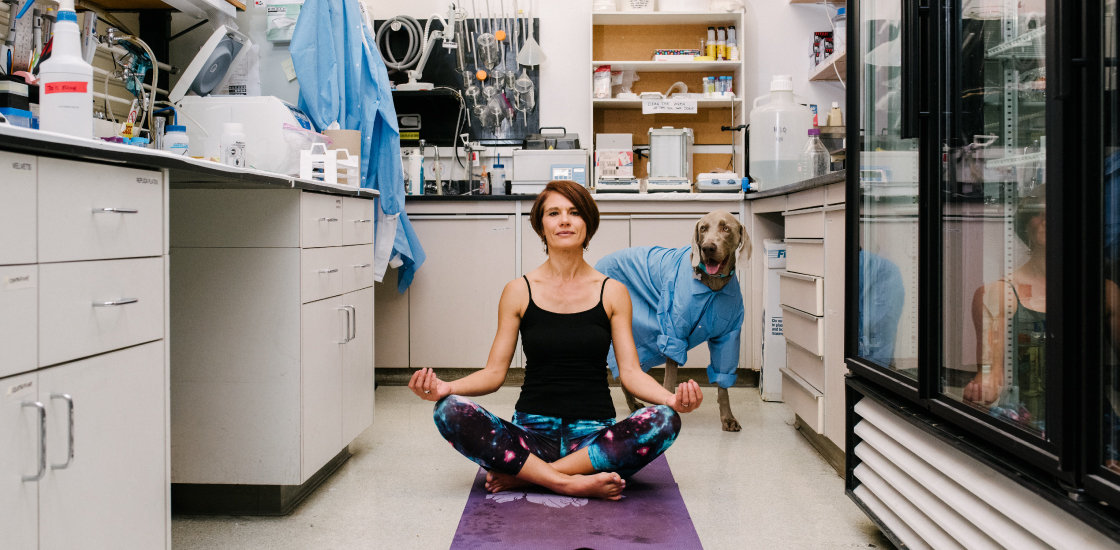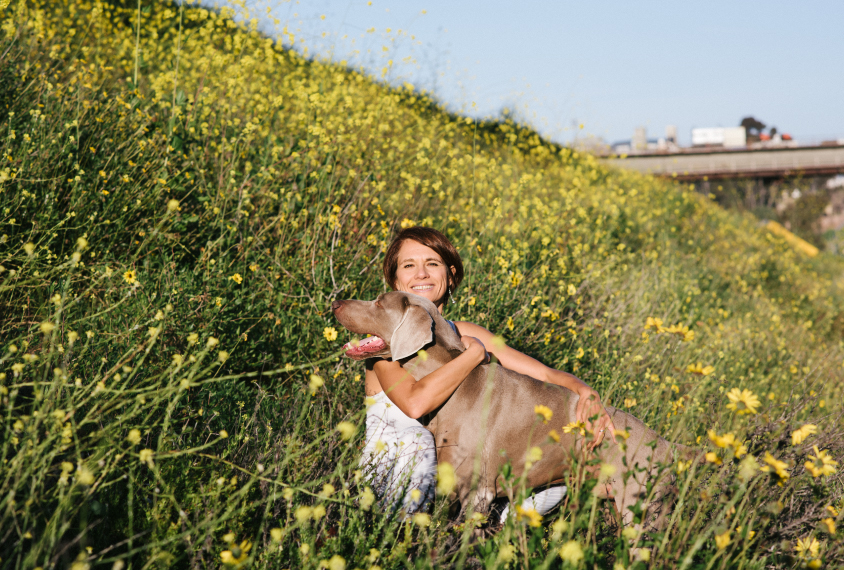Beyond the bench: A conversation with Lilia Iakoucheva
Lilia Iakoucheva spends her days running outdoors and solving the molecular complexities of autism, sometimes at the same time.

Lilia Iakoucheva starts her work day with a 5-mile run through a San Diego canyon. On weekends she tacks on a few extra miles and does yoga on the beach.
These excursions are milder versions of the pastimes of her youth: sky-diving, paraskiing and backpacking in the mountains with grizzly bears.
Iakoucheva brings the same intensity to work. As associate professor of psychiatry at the University of California, San Diego, she sometimes works 12 hours straight, forgetting to eat.
Iakoucheva studies the molecular basis of autism, using cutting-edge tools such as clusters of brain cells or mice engineered with the DNA editor CRISPR. She told Spectrum about one of her favorite places to discuss science: in line for the women’s shower at a conference.
Spectrum: What ‘big question’ drives your research?
Lilia Iakoucheva: We’re trying to understand how genetic mutations cause autism and what pathways they disrupt. As a community, we’re getting closer and closer to answering this question. Ultimately, I’d like to find at least one drug that targets core autism traits or a way to alleviate the effects of a mutation linked to autism before or shortly after birth.
S: Whose work do you admire?
LI: In the autism field, I particularly admire Huda Zoghbi and Mike Wigler. Huda studies the molecular basis of Rett syndrome, which has features of autism. She is so creative and productive, and she always asks the right questions in her research. Mike is working to unravel autism’s complex genetics. I really enjoy reading his papers — they are always crisp and to the point.
S: What does your day look like?
LI: After the kids leave for school around 7:30 a.m., I go for a trail run with my buddy Duke, a 3-year-old, 90-pound Weimaraner. That’s also my favorite time to have conference calls. If we’re on the same conference call and you hear heavy breathing, don’t be alarmed: I probably just forgot to mute my phone.
On a typical day, I read at least one new scientific paper, meet with my lab members, collaborators or visitors, and write progress reports and papers about our lab’s findings. I leave around 7:30 p.m. and collect the kids from their extracurricular activities on my way home. We usually have a late family dinner.
And then there are the crazy days when I have three deadlines, my mailbox is exploding with urgent requests, someone knocks on my door because I missed an important meeting (because I muted my phone so as not to be disturbed) and my daughter calls to tell me she needs an early ride home because she twisted her ankle at gymnastics.
On Fridays, we have a lab meeting from 4 to 6 p.m. It’s the perfect time to reflect upon the week’s work and to set goals for the following week.

S: Do you listen to music or podcasts while you work?
LI: I need complete quiet when I work, but I listen to news and podcasts when I run. My favorite podcasts include “Radiolab,” “This American Life,” “The Moth” and the “TED Radio Hour.”
S: Tell us your favorite story from a research conference.
LI: I just love Gordon Research Conferences. You stay in the student dorm with a common shower, and they don’t provide soap or shampoo. I remember knocking on doors looking for shampoo because I needed to wash my hair before giving my talk. I also love morning conversations while standing in line for the women’s shower, before anyone has had coffee, brushed her teeth or put on makeup.
S: What are you reading right now?
LI: I am on the second volume of the Neapolitan novels by Elena Ferrante. My all-time favorite authors, whose books often grace my nightstand, are Franz Kafka, Julio Cortázar, Knut Hamsun, Kazuo Ishiguro and Hermann Hesse. My son, Demian, is named after a character — Max Demian — in one of Hesse’s novels.
S: What is one of the riskiest things you’ve done?
When I was in graduate school in Moscow, I used to sky-dive with a group of friends to get my adrenaline going. We jumped with military parachutes that descend really fast. Back then in Russia, you’d get about two hours of training before your first jump — as opposed to the three-day course needed for a jump here in the United States.
One time, there were 10 of us, so they put us in order of decreasing weight so that the heavier people wouldn’t crash into the lighter people in the air. I jumped last and I vividly remember feeling as if I were stuck in the air. I saw the other parachutes below me, decreasing in size and moving toward the earth. I seemed to be stuck above everyone. I thought I’d never reach the ground — time just stopped. And then, suddenly, I saw the ground approaching really, really fast. It was such a relief.
S: Are you active on social media?
LI: Oh yes — by confiscating my teenage daughter’s phone for spending too much time on Instagram or Snapchat.
S: What do you eat or drink while working?
LI: My lunch is almost always the same: a whole avocado, two or three different fruits, a fig bar and water. I eat lunch in my office most days because I don’t like long interruptions. It’s hard for me to push the ‘restart’ button and get back into work mode after a long break.
S: How much sleep do you get?
LI: If I were forced to choose between food or sleep, I would choose sleep. I can’t function when I’m sleep-deprived, so I try for seven to eight hours a night.
S: How many unread emails are in your inbox right now?
LI: The number varies greatly depending on the day. Did I tell you about my crazy days? My mailbox cleanup time is usually the day after a grant or paper submission. So, I clean up my mailbox quite regularly.
Recommended reading

Expediting clinical trials for profound autism: Q&A with Matthew State

Too much or too little brain synchrony may underlie autism subtypes
Explore more from The Transmitter

This paper changed my life: Shane Liddelow on two papers that upended astrocyte research
Dean Buonomano explores the concept of time in neuroscience and physics

